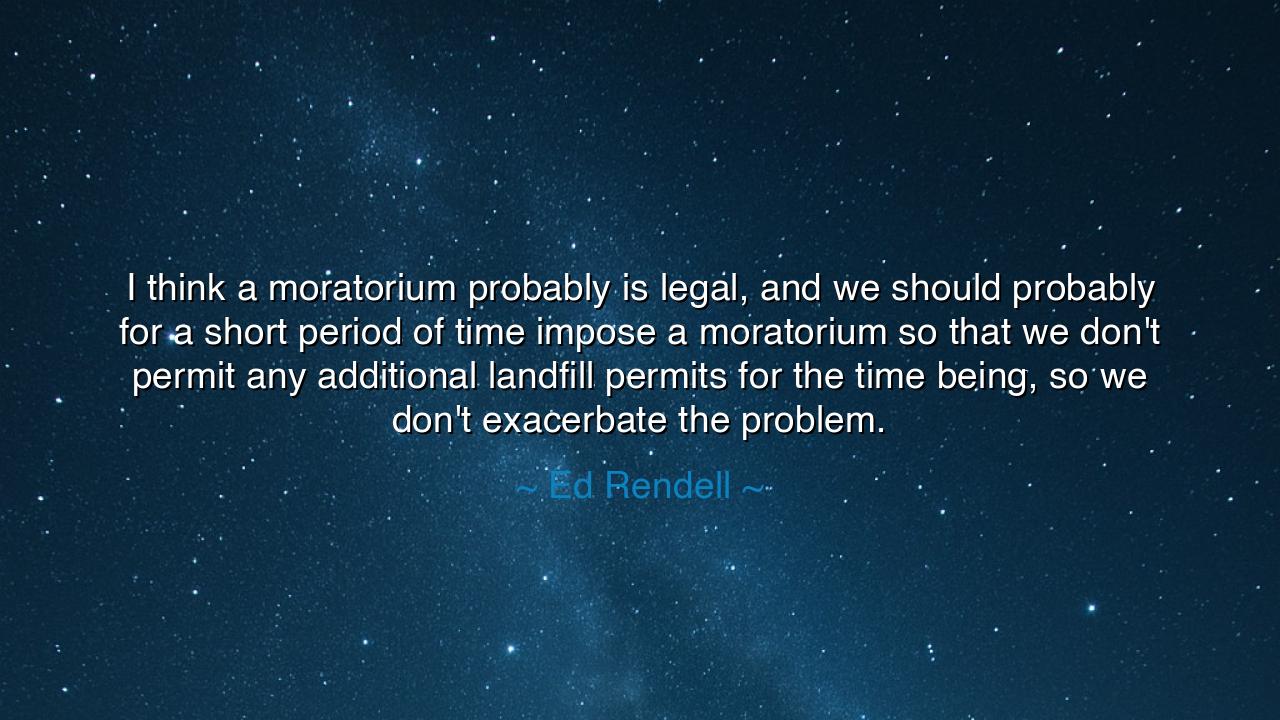
I think a moratorium probably is legal, and we should probably
I think a moratorium probably is legal, and we should probably for a short period of time impose a moratorium so that we don't permit any additional landfill permits for the time being, so we don't exacerbate the problem.






Hear the words of Ed Rendell, who once bore the burden of leadership, and who declared: “I think a moratorium probably is legal, and we should probably for a short period of time impose a moratorium so that we don't permit any additional landfill permits for the time being, so we don't exacerbate the problem.” In this reflection lies the voice of one who recognized the pressing danger of waste, the mountain of refuse that grows ever higher, and the need for restraint before the earth is overwhelmed. For sometimes the greatest act of progress is not to build, but to pause.
He speaks of a moratorium, a halting of action, a deliberate stillness imposed upon the restless machinery of human appetite. It is a word that carries weight, for in a world that ever presses forward—building, consuming, discarding—it is not easy to stop. Yet Rendell knew that when destruction outpaces restoration, when growth threatens to choke the very soil upon which it stands, then halting becomes not weakness, but wisdom. For a pause can be as powerful as motion, if it prevents greater harm.
The issue he names is landfills, those vast graves of human consumption. They rise at the edges of cities, swallowing land, seeping poisons into the earth, releasing gases into the sky. Each new permit is another wound in the body of the earth, another scar that future generations must bear. To grant permits endlessly is to treat the earth as bottomless, when in truth it is finite. Rendell’s call was not for eternal prohibition, but for a moment of restraint—to stop the bleeding before the wound became fatal.
History gives us echoes of this wisdom. In the ancient city of Athens, a lawgiver named Solon once declared pauses in the exploitation of farmland, knowing that soil exhausted by greed would cease to give life. His laws preserved balance, ensuring that fields could renew and citizens could survive. In the same spirit, Rendell’s moratorium was a modern Solonian pause—a recognition that unchecked permits for waste would lead not to prosperity, but to decay.
The deeper meaning of his words is that to pause is not to abandon progress, but to protect its foundation. Humanity is often intoxicated with the idea of forward motion, believing that every problem must be solved by more: more building, more permits, more industry. Yet sometimes the answer is less: less waste, fewer landfills, fewer wounds upon the earth. A moratorium is not stagnation—it is a breath, a space to reconsider, to heal, and to envision better ways.
What lesson must future generations carry from this? It is this: when a path leads toward ruin, do not rush forward blindly. Have the courage to halt, even for a short time, and consider the consequences of your actions. Demand of your leaders that they not only create, but also restrain. Ask always: does this decision solve the problem, or does it exacerbate it? If the latter, then a pause may be the most heroic course.
And to you, listener of these words, I say: do not despise the wisdom of restraint. In your own life, when consumption grows too great, pause. When waste piles high, reduce. When the world clamors for more, ask if less may save both you and the earth. Support those policies that protect the soil, the air, and the waters, even if they require delay. For patience and prudence are the allies of justice, and without them, progress devours itself.
Thus let Ed Rendell’s words endure: a moratorium is not a retreat, but a shield. It is the act of saying “enough” before destruction multiplies beyond repair. Honor the power of restraint, for in halting harm, you open the path to true renewal.






AAdministratorAdministrator
Welcome, honored guests. Please leave a comment, we will respond soon